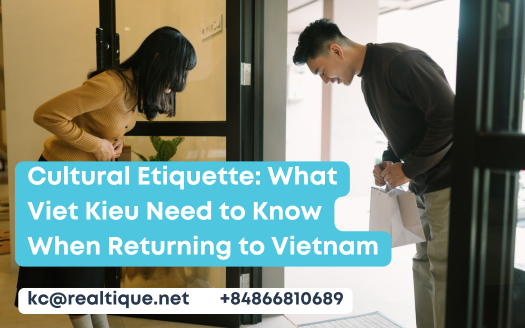Cultural Etiquette: What Viet Kieu Need to Know When Returning to Vietnam
Returning to Vietnam as a Viet Kieu offers a unique opportunity to reconnect with your heritage. However, understanding local cultural norms and etiquette is key to making a positive impression and avoiding misunderstandings. This guide provides practical tips on navigating Vietnam’s traditions, social norms, and everyday interactions.
Table of Contents
Greetings and Introductions: The First Impression
The way you greet and introduce yourself in Vietnam reflects respect and cultural awareness:
Traditional Greetings:
A slight bow or a nod is a common sign of respect.
Handshakes are customary in business settings but should be gentle.
For elders, a respectful bow or clasping your hands together is more appropriate.
Addressing Others:
Use titles and honorifics (e.g., ông, bà, anh, chị) followed by their name to show respect.
Avoid addressing people by their first name unless you’re familiar with them.
Exchanging Business Cards:
Always use both hands to present and receive business cards.
Take a moment to read the card before putting it away to show respect.
Tips for Success:
Practice basic Vietnamese greetings like “Chào” (Hello) and “Cảm ơn” (Thank you).
Smile and maintain eye contact during introductions to convey warmth and sincerity.
Observe and follow the lead of locals when unsure.
Dining Etiquette: The Art of Sharing a Meal
Meals in Vietnam are deeply rooted in family and community values. Understanding dining customs is essential:
Table Manners:
Wait for the host or eldest person to invite everyone to start eating.
Use chopsticks properly and avoid pointing them at others.
Place chopsticks neatly on the holder or your bowl when not in use.
Sharing Food:
Meals are often served family-style, so take small portions to ensure everyone gets a share.
Offering food to others is seen as a gesture of care and generosity.
Paying the Bill:
In social settings, the host typically pays for the meal.
If you wish to treat, insist politely but firmly.
Tips for Success:
Learn to use chopsticks if you’re unfamiliar with them.
Compliment the food and express gratitude to the host.
Avoid wasting food, as it is considered disrespectful.
Respect for Elders and Traditions
Vietnamese culture places great importance on respecting elders and maintaining traditional values:
Family Hierarchy:
Elders are highly respected and often consulted for important decisions.
Address family members by their titles rather than their names.
Traditional Practices:
Participate in customs like ancestor worship during special occasions.
Show reverence at family altars by bowing or lighting incense.
Public Behavior:
Avoid raising your voice or displaying anger in public.
Be mindful of modesty in dress and actions.
Tips for Success:
Always greet elders first in social gatherings.
Observe how locals interact with their elders to understand cultural nuances.
Participate in traditional activities to show appreciation for local customs.
Gift-Giving Customs: A Token of Appreciation
Gift-giving is a thoughtful way to show gratitude and build relationships in Vietnam:
Occasions for Gifts:
Visiting someone’s home.
Special occasions like Tet (Lunar New Year), weddings, or birthdays.
Choosing the Right Gift:
Fruits, tea, or specialty items from your home country are well-received.
Avoid gifts associated with bad luck, such as sharp objects or black-colored items.
Presenting the Gift:
Offer gifts with both hands as a sign of respect.
Avoid opening gifts in front of the giver unless prompted.
Tips for Success:
Wrap gifts neatly to enhance their presentation.
Learn the significance of certain colors and items in Vietnamese culture.
Express your appreciation verbally when giving or receiving a gift.
Navigating Daily Interactions and Public Behavior
Understanding everyday social norms can help you blend in and avoid awkward situations:
Politeness in Public:
Queue patiently and avoid cutting in line.
Speak softly and avoid drawing unnecessary attention to yourself.
Personal Space:
Vietnam has a high population density, so personal space may be limited.
Be mindful of this in crowded areas and public transport.
Tipping Etiquette:
Tipping is not mandatory but appreciated in restaurants, spas, and for tour guides.
Round up your bill or offer small cash amounts as a gesture of gratitude.
Tips for Success:
Observe locals to adapt to unspoken social rules.
Be flexible and patient with cultural differences.
Approach interactions with humility and a willingness to learn.
Need assistance navigating your return to Vietnam? Contact Realtique for expert advice on housing, legal matters, and cultural adaptation. Let us help you reconnect with your roots effortlessly.





